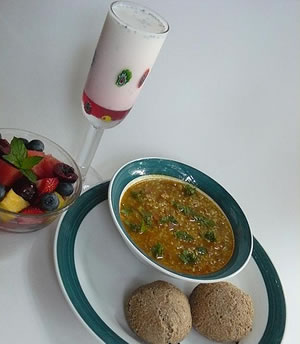 Ramadan is the ninth month of the Islamic lunar calendar. Every day during this month, Muslims around the world spend the daylight hours in a complete fast.
Ramadan is the ninth month of the Islamic lunar calendar. Every day during this month, Muslims around the world spend the daylight hours in a complete fast.During the blessed month of Ramadan, Muslims all over the world abstain from food, drink, and other physical needs during the daylight hours. As a time to purify the soul, refocus attention on Allah, and practice self-sacrifice. Ramadan is much more than just not eating and drinking. The Arabic word for "fasting" literally means "to refrain" - and it means not only refraining from food and drink, but from evil actions, thoughts, and words. Fasting is not merely physical, but is rather the total commitment of the person's body and soul to the spirit of the fast. Ramadan is a time to practice self-restraint; a time to cleanse the body and soul from impurities and re-focus one's self on the worship of Allah.
Ramadan fasting has spiritual, physical, psychological, and social benefits; however, man-made problems may occur, if fasting is not properly practiced.
During the holy month of Ramadan, our diet should not differ very much from our normal diet and should be as simple as possible. The diet should be such that we maintain our normal weight, neither losing nor gaining. However, if one is over-weight, Ramadan is an ideal time to normalize one’s weight. In view of the long hours of fasting, we should consume slow digesting foods including fiber containing-foods rather than fast-digesting foods. Slow digesting foods last up to 8 hours, while fast-digesting foods last for only 3 to 4 hours.
• Slow-digesting foods are foods that contain grains and seeds like barley, wheat, oats, millet, semolina, beans, lentils, whole meal flour, unpolished rice, etc. (called complex carbohydrates).
• Fast-burning foods are foods that contain sugar, white flour, etc. (called refined carbohydrates).
• Fiber-containing foods are bran-containing foods, whole wheat, grains and seeds, vegetables like green beans, peas, sem (papry), marrow, spinach, and other herbs like methie, the leaves of beet root (iron-rich), fruit with skin, dried fruit especially dried apricots, figs and prunes, almonds, etc. The foods eaten should be well-balanced, containing foods from each food group, i.e. fruits, vegetables, meat/chicken/fish, bread/cereals and dairy products. Fried foods are unhealthy and should be limited. They cause indigestion, heart-burn, and weight problems.
Sahur:
 First of all, there is no need to consume excess food at iftar, dinner. The body has regulatory mechanisms that activate during fasting. There is efficient utilization of body fat. Basal metabolism slows down during Ramadan fasting. A diet that is less than a normal amount of food intake but balanced is sufficient enough to keep a person healthy and active during the month of Ramadan.
First of all, there is no need to consume excess food at iftar, dinner. The body has regulatory mechanisms that activate during fasting. There is efficient utilization of body fat. Basal metabolism slows down during Ramadan fasting. A diet that is less than a normal amount of food intake but balanced is sufficient enough to keep a person healthy and active during the month of Ramadan.Consume a light sahur. Eat whole wheat or oat cereal or whole wheat bread, 1-2 servings with a cup of milk. Add 2-3 teaspoons of olive oil or any other monounsaturated or polyunsaturated fats in a salad or the cereal. Eat 1-2 servings of fruits. Yoghurt is good to consume in sahur.
Iftar:
The body's immediate need at the time of iftar is to get an easily available energy source in the form of glucose for every living cell, particularly the brain and nerve cells. Dates and juices are good sources of sugars.
Avoid
• Fried and fatty foods.
• Foods containing too much sugar.
• Over-eating especially at sahur (the meal before beginning the fast).
• Too much tea at sahur. Tea makes you pass more urine taking with it valuable mineral salts that your body would need during the day.
• Smoking cigarettes. If you cannot give up smoking, cut down gradually starting a few weeks before Ramadan. Smoking is unhealthy and one should stop completely.
 Eat
Eat
• Complex carbohydrates at sahur so that the food lasts longer making you less hungry.
• Haleem is an excellent source of protein and is a slow-burning food.
• Dates are excellent source of sugar, fiber, carbohydrates, potassium and magnesium.
• Almonds are rich in protein and fiber with less fat.
• Bananas are a good source of potassium, magnesium and carbohydrates. Drink
• As much water or fruit juices as possible between Iftar (breakfast) and bedtime so that your body may adjust fluid levels in time.
Normal or overweight people should not gain weight. For overweight people Ramadan is an excellent opportunity to lose weight. Underweight or marginally normal weight people are discouraged from losing weight. Analyzing a diet's energy and nutritional component, using food composition tables or computer software, will be useful in planning an appropriate diet.
It is recommended that everyone engage in some kind of light exercise, such as stretching or walking. It's important to follow good time management practices for Ibadah (prayer and other religious activities), sleep, studies, job, and physical activities or exercise.







